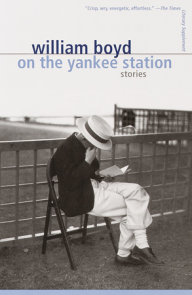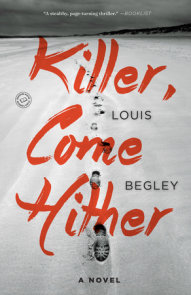READERS GUIDE
Questions and Topics for Discussion
INTRODUCTION
Across the Strait of Gibraltar from Tangier lies a land that holds the possibility of a better life for Azel, a frustrated and poor young Moroccan: Spain—a refuge from the poverty and political corruption that infest Morocco. Azel’s only goal is, as he puts it, to “burn up” the ocean between the two countries. But, beguiled by this dream, Azel doesn’t anticipate what will happen when he tries to leave his past in the ashes. This is the conflict at the heart of Tahar Ben Jelloun’s Leaving Tangier, his thirtieth book and a searing portrait of the immigrant journey toward a new life, one where terrible compromises are made, character is tested, and illusions are lost.
Ben Jelloun’s novel sheds a cold light on a side of North African life that is often overlooked and at times unimaginable; he is unflinching in his commitment to expose the sacrifice and pain inherent in the struggle to rise above poverty and move within the Western world. Leaving Tangier centers on the paths of Azel and his sister, Kenza, as they seek to reinvent their lives, in Barcelona, and how their paths diverge once they get there. Each sibling’s ambition rests in the hands of Miguel, a mysterious wealthy older Spaniard, and a man generous and loving one moment, demanding and cruel the next. Miguel’s power lies in what he can offer the siblings—and in what he can take away. Azel and Kenza, both romantically linked with Miguel, are forced to face their own characters: They must define the limits of their ambitions, their integrity, and what lines they are willing to cross to achieve their goals.
While Azel and Kenza are each seduced by the promise of Spain and what it represents, only one of the siblings achieves their dream; the other descends into nightmare. Through broken trust and broken hearts, sister and brother learn that personal reinvention can mean letting go of the best of one’s self. Yet Leaving Tangier doesn’t look only at Barcelona; it also reflects on those left behind in Morocco—the parents left hoping for the best, the children forced to work in factories, the aimless men falling prey to religious extremism. Dreams haunt everyone in the novel, sometimes leading to despair as they crumble, sometimes providing solace in times of woe. A masterful blend of poetic imagery and powerful language, Leaving Tangier is a meditation on power, destiny, and love. With its authentic rendering of people and cities both daring and dangerous, and its honest look into the complexities of the human heart, Ben Jelloun’s novel is a challenging read; it defies the conventions of polite society and dares to examine the limits of ambition and striving, expressing both sympathy and anger over a dark struggle that still exists today.
ABOUT TAHAR BEN JELLOUN
Tahar Ben Jelloun was born in Fez, Morocco, and immigrated to France in 1961. A novelist, essayist, critic, and poet, he is a regular contributor to Le Monde, La Républica, El País, and Panorama. His novels for Penguin include This Blinding Absence of Light and The Last Friend.
A CONVERSATION WITH TAHAR BEN JELLOUN
Q. You write in French but your books have been translated into many languages. What do you see as the challenges of publishing your work in translation? What is the relationship between author and translator when re-creating a text in another language?
Writing in a language that is not my mother tongue occasionally produces phrases or even turns of thought which are unusual in French. Some of my translators, particularly those from Nordic countries, often ask me to make clear how my characters are related. Others, like the Japanese, ask me to translate some Arabic words or specify the location of certain geographical places. In general, those familiar with North Africa and the Mediterranean do not ask me many questions. The only translation I can read and correct is the Arabic, when it is not one pirated by Syrian publishers.
Q. Is Leaving Tangier a reflection of the current situation in that city? If so, is Spain still the dominant destination for Moroccans? Do you see any shifts in the pathways of North African immigration?
Tangier is a port, a border town where one can see the Spanish coastline. It is not just Moroccans who come to Tangier to cross the Strait of Gibraltar. It is mainly the south Saharan Africans who started to come to Tangier in the early nineties. Now there are fewer and fewer. Monitoring of both sides, and Spanish-Moroccan police collaboration, has discouraged many candidates for exile. They now go to the Canary Islands. Morocco fights against illegal immigration because the main victims are illegal immigrants themselves, who are being scammed by Mafia smugglers.
Q. The novelist Georges Simenon once said, “I am at home everywhere and nowhere. I am never a stranger and I never quite belong.” Do you believe this statement is an apt description of the immigrant experience? As a Moroccan in France, what has been your own experience as an expatriate? Do you remain the person you were in your former country, or do you reinvent yourself in your embraced nation?
I understand the position of Georges Simenon, but I am at home in Morocco, without a doubt. In France it is another thing; I feel good in France, but sometimes I feel foreign. It depends on the political situations. And yet, France has given me a lot, and if I criticize it, it is because I am attached to it. For an immigrant, life is very different. He is a symbol of the human condition unloved, not recognized, a condition that places each human being at the level of his ability to work. Being poor and foreign is not conducive to well-being. In France, immigration is a direct result of colonization. This is not an enviable condition. My novel Leaving Tangier has a message for the young: Immigration is not a pleasure trip; it is not a fun weekend; it is hard and difficult, because there is racism, humiliation, and loneliness.
Q. Azel’s sexuality is a vehicle for power, used both by him and against him. Do you see his sexuality as something Azel can adapt to serve his goal of emigration, or is his sexuality more a statement on the exploitation of his desperation to leave Tangier? Is this trade of one’s own body for opportunity common?
Azel is a young heterosexual man. He likes to make love to women, but his desire to leave his country and find work is stronger than the assumption of his sexuality. At least in the beginning he thinks he can assume the two sexualities. Soon he realizes that by selling his body, he is losing his soul. He cannot move from the bed of a woman to that of a man; he tries to but ends by failing and losing himself. This form of prostitution exists everywhere there is poverty. It is not more common in Morocco than elsewhere.
Q. Do you see the characters in your novel as disappointed and disillusioned more by their own actions or by the actions of others? If Kenza and Azel are lured by the dream of a new life in Spain, are they also betrayed by it—or by themselves?
I think they are disappointed in themselves. Especially Azel, who is intelligent but is overwhelmed by remorse. He cannot stay the course because he is not cynical enough; he is innocent, and that is why he fails at everything. Kenza was disappointed by the Turk, but she is strong enough to move on; in any case, stronger than her brother. She is a positive character whom I like. The two are examples of the complexity of life when fate is diverted from its path.
Q. Your novels are all brutally honest and occasionally disturbing. What reaction has your work received, particularly in North Africa and the Middle East? Is there a marked difference in the response from readers and critics in Europe as opposed to North America?
This novel was widely read and discussed in Morocco, where I introduced it upon its release. I do not know if it has caused young people tempted by exile to reflect. The role of literature is limited; a novel cannot change things, but at best it makes people think. Leaving Tangier was well received in countries very different from Morocco, like Finland, Sweden, and Korea, and I hope it will help American readers to better understand what happens, for example, at the Mexican border. The problems are the same; only the countries are different.
Q. Leaving Tangier is a wrenching and transportive read, but was it equally emotionally affecting to write? What are your relationships with your characters?
This is a novel that I rewrote three times by changing the construction. I worked a lot, because I wanted to reach a level where any reader from any country can identify with one of my characters. I remember the only advice Jean Genet had given me: “In writing, think of the reader; take him by the hand and tell him your story.” To think of the reader is to respect him. I like my characters, because I identify with each one and put myself in his skin like an actor. Fortunately, after the publication of the book I forget.
Q. Many people anxious to flee to the West are taken advantage of by characters such as Al Afia, smugglers who make a profit off others’ despair; women are especially vulnerable to the dangers involved in illegal immigration. Remarkably, Kenza navigates this path more successfully than Azel, who flounders. Why did you choose to present the siblings this way?
Women in Morocco are more interesting, more combative, more demanding. Kenza could have chosen the easy solution and fallen into prostitution, but she has values and principles and is realistic at the same time. That’s why she does better than her brother, who will not be strong enough to withstand the difficulties of life.
Q. Edward Said argued that literature and criticism from the West about the East creates false impressions of Arab and Eastern countries and reinforces a divide between the cultures. Do you agree with this? Where do you feel you are within this divide? What cultural concerns do you feel your work addresses?
He is right. The view that the West imposed on the Arab world has always been one of superiority, resulting in colonization. However, there have been very talented Orientalists, honest people like Jacques Berque, Maxime Rodinson, Louis Massignon, etc. They tried to talk about the Arab world from the inside. They spoke Arabic and were acquainted with the basic texts of the language. Today we are witnessing a vision based on prejudice and mediocrity. Arab culture is devalued, poorly understood, even ignored. This is because of political problems and nondemocratic leaders, and then also because of the oil that has distorted the true meanings of this civilization.
Q. Could you discuss the character of Moha and the significance of the timing of his appearance halfway through the novel?
Moha is my favorite character—my double who runs through all of my books. He is speech, the voice of justice; he is my Zarathustra! He speaks frankly, because he is regarded as insane or wise. He intervenes at the end to give the novel its literary and surrealist color.
Q, This is your thirtieth book—how are you able to be so prolific? What is your writing routine? How do you prepare for each work? Of all the forms in which you write, which do you feel suits you best?
I work every day; it is a daily discipline. I have many stories to tell, because I come from a society that has a great wealth of tales; it’s enough to just listen to people talking in a café to put one to work. I am proud and happy to belong to the Moroccan society because it feeds my imagination and provides me with good subjects. Right now I’m working on a book calledMorocco-Novel, where I try to say everything, just tell what I see, what I hear. I’ve been working on it for two years, and I still have a year to go. It is inexhaustible.
DISCUSSION QUESTIONS
The characters refer to crossing the Strait of Gibraltar as “burning up” the ocean. What does this expression convey about the feelings Moroccans have toward the journey between Spain and Tangiers?
Does Kenza achieve her goals in Barcelona? Why does she return to Morocco?
What is the appeal of extremist religions such as the radical Islamist organization that attempts to recruit Azel? Why did they target him? Why does he react the way he does?
Is Miguel a sympathetic character? What is his purpose in the novel? Does he ultimately help or hurt the siblings?
Can Kenza and Azel really leave Tangiers? They physically leave, but what about culturally and emotionally? What examples from the novel support your opinion?
Is it possible to reinvent yourself? If not, why? If so, is it necessary to leave your friends, home, or country in order to do so?
Who is the old woman in Malika’s dream? What was your reaction to her death?
The United States is a country built by immigrants, yet many people feel the country is currently plagued by illegal immigration. Is there ever any justification for illegal immigration? Do you sympathize with Azel and Kenza’s desire to leave? Would their stories have been different had they immigrated to the United States? Would your response to their situation have been different?
The perspective from which Leaving Tangier is told switches from character to character, chapter to chapter. How does each chapter shift the development of the overall story line of the novel?
Discuss the final chapter. What does it mean? Why does each character return in the manner that he or she does?
The image of fire occurs frequently throughout Leaving Tangier. How does it function as a metaphor for the novel? Why is Al Afia’s name appropriate for his work as a smuggler? What is the “ultimate flame” mentioned in the last line of the book?




















